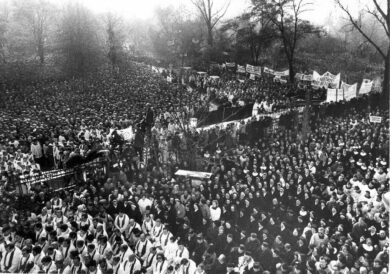October 14, 2024
Poland’s church remembers its heroic ‘Solidarity Martyr’ — Blessed Jerzy Popieluszko
WORLD
By Jonathan Luxmoore, OSV News

Close to a million people attend a Nov. 3, 1984, funeral in Warsaw for Father Jerzy Popieluszko, Solidarity’s trade union chaplain in communist Poland, who was murdered by Sluzba Bezpieczenstwa secret service agents Oct. 19, 1984. After being abducted, he was severely beaten, his body tied with ropes and thrown into the Vistula River. On Oct. 30, 1984, his body was dredged from a Vistula River reservoir. Pope Benedict XVI recognized Father Popieluszko’s martyrdom Dec. 19, 2009, and he was beatified in 2010. (OSV News photo/courtesy Institute of National Remembrance IPN)
(OSV News) — As 40 years have passed since the murder of Blessed Jerzy Popieluszko, one of their church’s most famous priests, Polish Catholics are urging people everywhere to revisit and learn from his heroic testimony.
“He was treated as a criminal and killed by state agents for daring to proclaim the Gospel,” explained Father Jan Sochon, a childhood friend.
“Though times have changed, some of the mechanisms used to rule over people are still in place today. This is why he remains influential, a sign of the times summoning us to reflect and change,” he said.
The Warsaw-based priest spoke ahead of 40th anniversary commemorations of the death of Blessed Popieluszko (1947-1984), chaplain of Poland’s Solidarity union — the first independent trade union in the Soviet bloc — who was brutally murdered by officers of Sluzba Bezpieczenstwa, or SB, which was communist Poland’s security service.
In an OSV News interview, Father Sochon said Blessed Popieluszko had “grown and matured” through his Catholic upbringing, gaining inner strength to help create conditions for a “free, democratic Poland.”
Meanwhile, a biographer of the priest told OSV News his cult remained strong among Solidarity veterans, but had also been passed on to younger people raised after communist rule.
“Father Jerzy is still alive — not just in the memory of those who encountered him all those years ago, but also in the contemporary imagination,” said Ewa Czaczkowska, a historian from Warsaw’s Cardinal Stefan Wyszynski University.
“Large numbers still visit his grave, and turn to him at moments of personal crisis, while his teachings about solidarity, justice, mutual respect and living in truth remain relevant today in very different circumstances,” she said.
The bound and gagged body of 37-year-old Father Popieluszko, known nationwide for homilies defending human rights, was dredged from a Vistula River reservoir on Oct. 30, 1984, 11 days after he was abducted while returning overnight from a Mass in Bydgoszcz.
The priest’s Nov. 3 funeral, the largest in Polish history, was attended by between 600,000 and a million people at Warsaw’s St. Stanislaus Kostka Church, where his grave has since been visited by 23 million, including many world leaders.
Father Popieluszko was beatified in June 2010 at an open-air Mass attended by his mother, Marianna Popieluszko.
Pope Benedict XVI had recognized the martyrdom of Father Popieluszko Dec. 19, 2009, which cleared the way for his beatification. The Polish church had launched the sainthood cause for the murdered priest in February 1997 and forwarded documentation about his life to the Vatican that year.
In a pastoral letter, read in churches Sept. 29, Poland’s Catholic bishops said the “fear and manipulation” used by communist rulers had been deflated “wherever his voice reached,” while his refusal to be intimidated had made him “a symbol of freedom in Poland and abroad.”
“The humble figure of the priest has transcended geographical, cultural and generational boundaries. He has become the patron saint of Solidarity, of persecuted Christians, and of societies struggling against totalitarianism, consumerism and the chaos of values,” the bishops said.
But above all, the bishops said, Blessed Popieluszko “is the patron saint of people who want to live a worthwhile life. He is also the patron saint of young people, as a guide in a complicated world of half-truths, conflicts, fear and hatred.”
Born in Okopy in northeastern Poland, Jerzy Popieluszko served in the army from 1966 to 1968, suffering permanent health damage from mistreatment during his military service. He trained for the priesthood in Warsaw.
After being ordained in 1972 by Poland’s primate, Cardinal Stefan Wyszynski, he served in several Warsaw parishes, also acting as a medical chaplain, before becoming assistant priest in the Zoliborz district at St. Kostka Parish in 1980, known as St. Stanislaus Church.
When Solidarity strikes erupted, the priest was asked to conduct field Masses at the nearby Huta Warszawa steelworks, recalling in a diary how he had heard confessions from workers “exhausted to the limits of endurance” but understanding “they gain strength precisely in unity with God and the church.” The altar was improvised, constructed by workers from wooden elements in a place designed to be a temple of work, deprived of God.
Following the Dec. 13, 1981, imposition of martial law, he attended court hearings and organized help for the interned, and began celebrating monthly “Masses for the Homeland.”
With news of his Oct. 19, 1984, abduction broadcast worldwide, four SB agents were convicted in February 1985 of slaying the priest, but they were released early under controversial amnesties, while two former secret police generals were charged in 1994 with involvement but cleared for lack of evidence.
Later attempts to charge Poland’s communist rulers, Gens. Wojciech Jaruzelski (1923-2014) and Czeslaw Kiszczak (1925-2015), with responsibility for Father Popieluszko’s death also failed, while Warsaw’s District Court dropped charges in 2019 against ex-agents accused of planting weapons and explosives in the priest’s apartment.
Czaczkowska told OSV News evidence indicated the priest’s killing had involved rival “communist party elements” in Poland and Moscow, but said there was “no firm proof” to support claims the priest was interrogated and killed at a Soviet army base in Poland.
“If an archive is opened some day, we might find out more — but with many of those involved now dead, it’s unlikely anyone else will ever face justice,” said Czaczkowska, whose latest biography of Father Popieluszko was published in June.
“What matters is that people should live by the truth, irrespective of who’s in government under which system. Father Jerzy still reminds us, in today’s chaos of values and half-values, that truth and humanity always exist,” she said.
At St. Stanislaus Kostka Church, the priest’s grave is designed from a rosary sent to him by St John Paul II, who visited the site in June 1987. A multilingual crypt museum, inaugurated in 2004, draws 65,000 visitors annually.
“Of course, there’ve been many martyrs since Father Jerzy’s time — but he still calls people, even from his distant horizon, to an evangelical life of solidarity and witness,” explained Father Sochon, a theologian and poet. “Just as Christ’s own martyrdom embraces the whole world, I think Father Jerzy’s teaching about spiritual and moral values extends to people everywhere.”
Czaczkowska added that the priest has become a universal figure, revered as much for his exemplary humanity as for his epic struggle with communist repression.
Among foreigners visiting the priest’s burial place, she recently met a Ugandan seminarian who’d come to request his intercession against illness and a French woman who wished to thank him for helping her recover after a terrorist attack.
“People are also coming from countries without full religious freedom to learn how to live where the faith can’t be confessed openly,” the historian told OSV News.
The priest’s anniversary will be marked Oct. 19 by a Warsaw march and Mass at St. Stanislaus Kostka Church, preceded by a novena of prayer, and by an Oct. 20 Mass at the New Martyrs Sanctuary in Bydgoszcz, where Blessed Popieluszko preached his last sermon.


 Facebook
Facebook Youtube
Youtube
